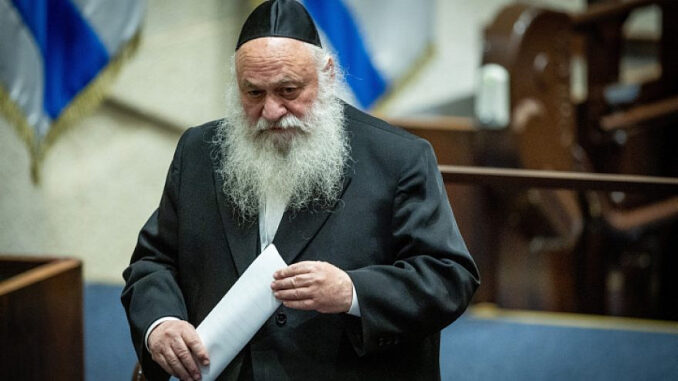By Jewish News Syndicate (JNS)

Knesset Member Yitzhak Goldknopf, leader of the United Torah Judaism Party, heads to the podium at the Knesset, Dec. 29, 2022.
Yitzhak Goldknopf, leader of the United Torah Judaism Party (UTJ), said that “if the new recruitment plan isn’t settled, the government will fall apart,” speaking of a haredi conscription law the ultra-Orthodox parties are insisting upon.
Speaking to Mishpacha, a haredi magazine, which ran the quote as a headline, the ultra-Orthodox political leader, who is also Israel’s minister of construction and housing, said: “The Prime Minister received an unequivocal message from me according to which there is an order from the Council of Torah Sages that if the conscription law is not passed before the budget [which is due by May 29], we will withdraw from the government. As long as there is no other [council] directive, this is what will be done.”
The Council of Torah Sages is the supreme rabbinical policy-making council of Agudat Yisrael and Degel HaTorah in Israel [the two components of United Torah Judaism]; and of the Agudath Israel of America movement in the United States.
Goldknopf’s comments follow those of fellow UTJ member MK Meir Porush, the minister of Jerusalem affairs and Jewish tradition, who said on Tuesday that if Israeli Prime Minister Benjamin Netanyahu can’t pass the haredi draft law and the override clause (a bill connected to judicial reform), then “Don’t be prime minister, go home.”
“Why did I lend a hand to such a government, to hear the same excuses from the Bennett and Lapid era?” said Porush, referring to Yamina Party head Naftali Bennett and Yesh Atid Party Chairman Yair Lapid, leaders of the previous government.
The coalition’s haredi partners hope to settle the issue of conscription for the sector’s young men. Two haredi parties, Shas and United Torah Judaism, had initially demanded that draft-related legislation pass before they vote to approve the state budget.
Ultra-Orthodox leadership discourages military service, seeing it as corrupting and a distraction from Torah study. In 2021, 87% of haredi 18-year-olds didn’t enlist, while 86% of non-haredi 18-year-olds did so. This has caused sharp friction within Israeli society, with the majority dissatisfied that the burden of service is not distributed equally.
The proposed legislation would lower the age at which haredi men need to obtain deferments from 26 to 23 (or younger—the exact age is still being negotiated). Lowering the age has less to do with the military than with the economy. Ultra-Orthodox men are staying in yeshivah longer out of fear of conscription. The Finance Ministry, looking to the national economy, would like to see haredi men enter the workforce sooner and have time to study for better-paying, more productive jobs before marriage. The ministry is pushing for deferments to be required only up to the age of 21. The IDF has so far agreed to 23.
The bill also includes provisions to significantly increase the pay of combat soldiers, reduce the length of time noncombat soldiers serve to two years, and let the government set haredi draft quotas.
An existing National Service Law is set to expire on July 31. Initially passed in 2014, and amended under haredi pressure in 2015, it set annual allotments of haredi draftees to the IDF and punished yeshivot that didn’t meet those allotments. In September 2017, the Supreme Court, sitting as the High Court of Justice, struck down the law, deeming the exemptions discriminatory against those who serve.



Leave a Reply
You must be logged in to post a comment.